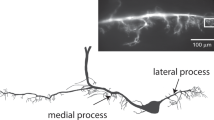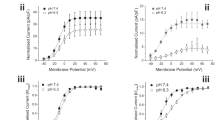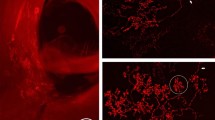Abstract
PREVIOUS studies of barbiturates have failed to show significant effects on voltage-dependent membrane conductances at clinically relevant concentrations1–3. As these drugs have effects on synaptic processes at clinical concentrations, some investigators have concluded that the primary site of action of barbiturates is at the synapse1–5. However, we have found that barbiturates at low concentrations (0.05–0.5 mM) can have profound effects on voltage-sensitive conductances in Aplysia neurones. Barbiturates suppress the ability of these neurones to fire continuously in response to prolonged depolarisation. A voltage-clamp analysis has revealed the membrane currents underlying this effect, indicating that barbiturates act by enhancement of a slowly developing outward current that appears in response to depolarisation of the cell.
This is a preview of subscription content, access via your institution
Access options
Subscribe to this journal
Receive 51 print issues and online access
$199.00 per year
only $3.90 per issue
Buy this article
- Purchase on Springer Link
- Instant access to full article PDF
Prices may be subject to local taxes which are calculated during checkout
Similar content being viewed by others
References
Barker, J. L. Brain Res. 92, 35 (1975).
Sato, M., Austin, G. M. & Yai, H. Nature 215, 1506 (1967).
Loyning, Y., Oshima, T. & Yokota, T. J. Neurophysiol. 27, 408 (1964).
Nicoll, R. A. Proc. natn. Acad. Sci. U.S.A. 72, 1460 (1975).
Nicoll, R. A. Science 199, 451 (1978).
Wilson, W. & Goldner, M. M. J. Neurobiol. 6, 411 (1975).
Partridge, L. D. & Stevens, C. F. J. Physiol., Lond. 256, 315 (1976).
Prichard, J. W. & Kleinhaus, A. L. Comp. gen. Pharmac. 5, 229 (1974).
Russell, J. M. & Brown, A. M. J. gen. Physiol. 60, 519 (1972).
Brodwick, M. S. & Junge, D. J. Physiol., Lond. 223, 549 (1972).
Jansen, J. K. S. & Nicholls, J. G. J. Physiol., Lond. 229, 635 (1973).
Junge, D. Comp. Biochem. Physiol. 42 A, 975 (1972).
Barker, J. L. Brain Res. 93, 77 (1975).
Takeuchi, A. & Chalazonitis, N. C.r. Séanc. Soc. Biol. 152, 491 (1968).
Richards, C. D. J. Physiol., Lond. 227, 749 (1972).
Shapavolov, A. I. Fedn Proc. 23, T113 (1964).
Somjen, G. Anesthesiology 28, 135 (1967).
Sasaki, K. & Otani, T. Jap. J. Physiol. 11, 443 (1961).
Author information
Authors and Affiliations
Rights and permissions
About this article
Cite this article
COTE, I., ZBICZ, K. & WILSON, W. Barbiturate-induced slow outward currents in Aplysia neurones. Nature 274, 594–596 (1978). https://doi.org/10.1038/274594a0
Received:
Accepted:
Issue Date:
DOI: https://doi.org/10.1038/274594a0
Comments
By submitting a comment you agree to abide by our Terms and Community Guidelines. If you find something abusive or that does not comply with our terms or guidelines please flag it as inappropriate.



